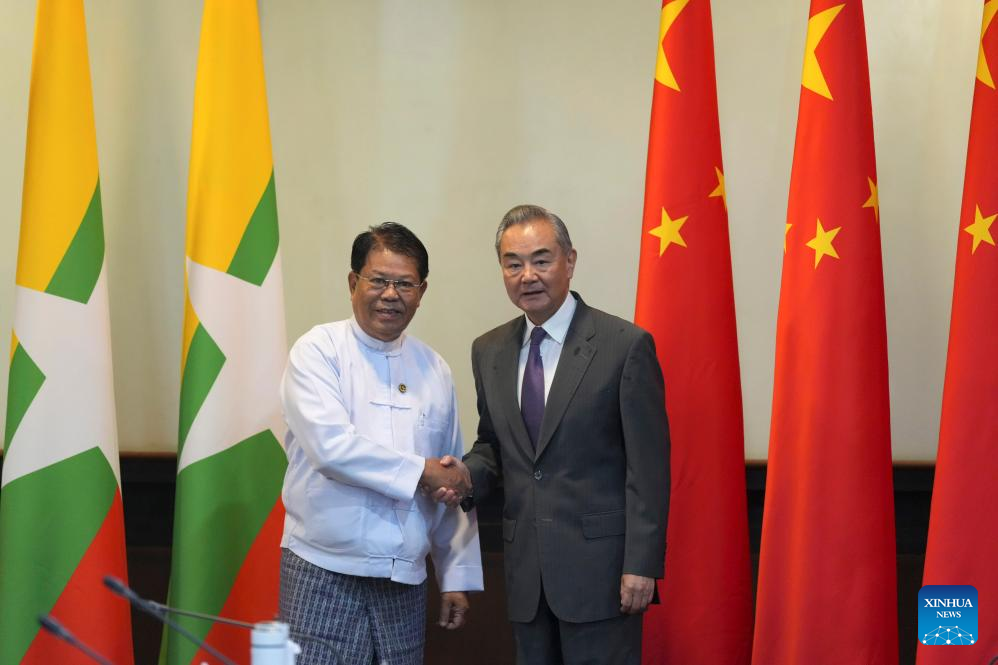
Chinese Foreign Minister Wang Yi, also a member of the Political Bureau of the Communist Party of China Central Committee, meets with Myanmar's Deputy Prime Minister and Union Minister for Foreign Affairs U Than Swe in Nay Pyi Taw, Myanmar, Aug. 14, 2024. (Xinhua/Li Guangtao)
NAY PYI TAW, Aug. 14 (Xinhua) -- Chinese Foreign Minister Wang Yi said here Wednesday that China is willing to work with Myanmar to jointly advance the building of a China-Myanmar community with a shared future.
Wang, also a member of the Political Bureau of the Communist Party of China Central Committee, made the remarks when meeting with Myanmar's Deputy Prime Minister and Union Minister for Foreign Affairs U Than Swe in the Myanmar capital.
Wang said, for more than 70 years, regardless of the changing international landscape, China and Myanmar have consistently upheld the spirit of the Five Principles of Peaceful Coexistence that they jointly advocate, setting a good example of relations between countries of different sizes based on equality and mutual support.
China is willing to work with Myanmar to inherit and promote the paukphaw (fraternal) friendship, and continue to support and help each other, Wang noted.
As the world today is undergoing both transformation and upheaval, China's development contributes to the forces for world peace and strengthens stabilizing factors, the Chinese foreign minister said.
The 20th Central Committee of the Communist Party of China recently held its third plenary session, which clearly stated that China will comprehensively deepen reforms, build a high-level socialist market economy, and promote high-quality development and high-level opening-up. This will provide new opportunities and new momentum for China-Myanmar cooperation, Wang said.
He said that China is willing to work with Myanmar to deepen the Belt and Road cooperation, effectively implement the three major global initiatives, and steadily advance the building of a China-Myanmar community with a shared future.
Both sides should maintain high-level exchanges and enhance political mutual trust; steadily promote the construction of the China-Myanmar Economic Corridor and ensure the safe and smooth operation of China-Myanmar oil and gas pipeline project; strengthen security cooperation and jointly combat cross-border criminal activities; accelerate cooperation in agriculture and other fields to help Myanmar improve people's livelihoods, Wang noted.
He said, taking the opportunity to celebrate the 75th anniversary of diplomatic ties between China and Myanmar next year, the two sides will carry out a series of celebratory activities, strengthen cultural exchanges, and consolidate public support.
Than Swe said Myanmar-China relations have a long history and the two countries enjoy a profound paukphaw (fraternal) friendship, adding that 2025 will mark the 75th anniversary of establishing bilateral diplomatic ties.
Myanmar attaches great importance to its relations with China, adheres to the one-China principle, and supports the Belt and Road Initiative, the three major global initiatives, and a community with a shared future for humanity, Than Swe said.
He said Myanmar stands ready to work with China to engage in closer exchanges at all levels, speed up construction of major projects under the framework of the China-Myanmar Economic Corridor, deepen cooperation in fields of agriculture, energy, and tourism, and promote a Myanmar-China community with a shared future to achieve greater results, so as to benefit the Myanmar people.
Than Swe stressed that Myanmar will make all-out efforts to ensure the safety of Chinese project personnel in Myanmar, effectively safeguard security and stability at the Myanmar-China border, and jointly combat cross-border crimes with China.
The two sides exchanged views on Lancang-Mekong Cooperation (LMC). They agreed to implement the important consensus reached at the fourth LMC Leaders' Meeting to anchor the goal of building a community with a shared future for Lancang-Mekong countries, promote more fruitful LMC results, and jointly promote stable development and regional integration. ■







